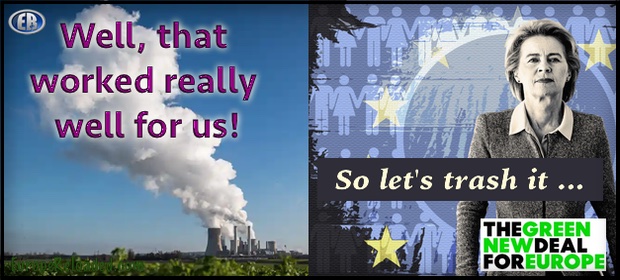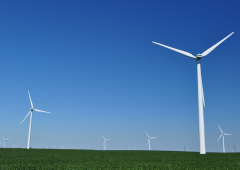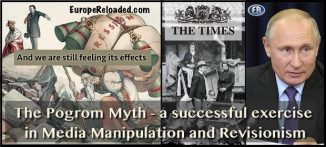
ER Editor: Our only hope is that another Brexit (Italexit? Frexit?) will happen before this madness truly gets underway, making everybody poorer.
********
Europe Can’t Afford A New “Green Deal”
Today’s brand of the left-leaning politician is all about substituting what sounds good for what actually works.
Modern politics, whether in the US or Europe, is about taking a chainsaw to everything that produced even a modicum of success to appease the deities espousing progressive orthodoxy. There is no better example of this than fossil fuels, an energy source that has lifted us out of destitution and darkness, and given us incredible wealth that the world had never witnessed.
What is the Left interested in doing? Using confiscation, cronyism, centralization, and coercion to combat climate change. The European Union will achieve these objectives through the boondoggle-in the-making Green Deal (GD).
What is the Green Deal?
The European counterpart is a bit more realistic than the American version, aiming for net-zero emissions within thirty years rather than in a decade. But that is probably the best thing you can say about the proposal, which was approved by the European Parliament—though some policymakers had requested even greater ambitions to be inserted into the climate change scheme. Overall, the Green Deal is bad economics that will affect the already dreary conditions of Europe and exacerbate the slowdown.
The Green Deal begins with the European Commission examining every European Union law and regulation and then modifying it to align with the bloc’s new climate objectives. If you thought the EU’s regulations were already egregious, just you wait until March 2021, when the bureaucrats will submit a package containing all the statist goodies. At least Great Britain will not have to.
Policymakers want to implement a circular economy, one that emphasizes the sustainability factor in how the Continent produces goods. Its objective is to consume fewer materials and ensure that there is more concentration on reusing and recycling.
Like the Green New Deal (GND), the EU’s flagship program is to “at least double or even triple” the renovation rate of buildings. Today, this figure stands at about 1 percent, so bumping it up would require a concoction of interventions and mandates to ensure buildings are more efficient.
One provision is to introduce carbon tariffs for nations that refuse to reduce their greenhouse gas emissions at a comparable rate to Europe. Another aspect that has cronyism written all over it is the Green Deal’s amplification of public-private partnerships to support research and innovation in technologies that lead to low-carbon steel generation, green batteries, and better nutrient management by farmers.
A common word used throughout the commission’s plan is “promotion.” Officials want to promote alternative sustainable fuels. They want to promote electric vehicle use. They aim to promote deforestation-free agricultural products. They desire to promote a reduction in air travel and more rail and water transportation of freight. Promotion is a kinder word for coercion.
European Commission president Ursula von der Leyen believes this is the region’s “moon moment”:
We do not have all the answers yet. Today is the start of a journey. This is Europe’s man on the moon moment. Our goal is to reconcile the economy with our planet and to make it work for our people.
Euros and Cents
So, how much will all this cost? Over in the US, the GND has a price tag of around $93 trillion. The GD is estimated to receive EU support funding of $100 billion. This is a steal until you realize that this is not the total cost that will be required to reach the EU’s objectives. It is essentially seed money to get things going, a so-called transition mechanism. The final tally will likely be a lot higher.
The other potential cost is the industries that could be impacted by this initiative. Analysts are sounding the alarm that established businesses would be seriously affected by the decarbonization push and the greater focus on renewable sources. An example of this would be coal.
Coal is indeed dying a slow death, with the primary assailant being the free market. However, coal’s demise is being accelerated by the state, even though it continues to be an important market in eastern Europe—in terms of consumption and production. Although coal has been gradually diminishing, it still employs tens of thousands of people, and the latest estimates say that as many as 160,000 people could be out of work within the next decade or so because of the EU.
And you have to think that this is also a jab at Russia. In the last few years, Russia has been supplying the rest of Europe with a lot of energy. Moscow’s dominance in the energy industry has been so immense that it is constructing more pipelines to gain a greater market share of Europe’s gas market. However, should the GD become the law of the land, the pipelines may be demolished or out of order, since they would no longer adhere to the standards of the climate strategy.
The greatest cost might be the lost economic growth.
“The Green Deal is the most fundamental shift in European energy policy we have seen in 20 years. Companies in the sector should not underestimate the disruption it will bring,” Nick Butler wrote in the Financial Times.
Clear, Simple, and Wrong
Every proposal to fight climate change and save the planet is based on the concentration of power and the aggressive expansion of regulatory implementation and enforcement. Policymakers refuse to allow the free market to create innovative solutions to environmental problems, effectively admitting that the planet is too important to leave up to the inhabitants. Only the government, and those it handpicks to receive the benefits of public spending, can be Mother Nature’s best friend. Unfortunately, this reckless abandon of innovation and industry, which is far too common in the region, will be another step toward Europe’s ruin.
As H. L. Mencken wrote, “For every complex problem, there is an answer that is clear, simple, and wrong.” The EU knows this all too well.
************
Original article

••••
The Liberty Beacon Project is now expanding at a near exponential rate, and for this we are grateful and excited! But we must also be practical. For 7 years we have not asked for any donations, and have built this project with our own funds as we grew. We are now experiencing ever increasing growing pains due to the large number of websites and projects we represent. So we have just installed donation buttons on our websites and ask that you consider this when you visit them. Nothing is too small. We thank you for all your support and your considerations … (TLB)
••••
Comment Policy: As a privately owned web site, we reserve the right to remove comments that contain spam, advertising, vulgarity, threats of violence, racism, or personal/abusive attacks on other users. This also applies to trolling, the use of more than one alias, or just intentional mischief. Enforcement of this policy is at the discretion of this websites administrators. Repeat offenders may be blocked or permanently banned without prior warning.
••••
Disclaimer: TLB websites contain copyrighted material the use of which has not always been specifically authorized by the copyright owner. We are making such material available to our readers under the provisions of “fair use” in an effort to advance a better understanding of political, health, economic and social issues. The material on this site is distributed without profit to those who have expressed a prior interest in receiving it for research and educational purposes. If you wish to use copyrighted material for purposes other than “fair use” you must request permission from the copyright owner.
••••
Disclaimer: The information and opinions shared are for informational purposes only including, but not limited to, text, graphics, images and other material are not intended as medical advice or instruction. Nothing mentioned is intended to be a substitute for professional medical advice, diagnosis or treatment.





